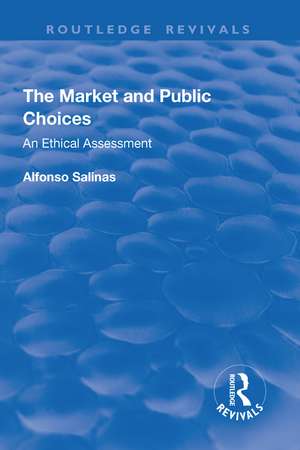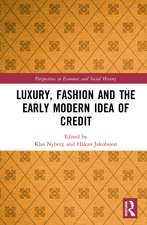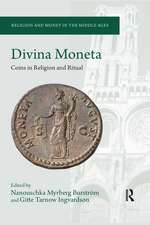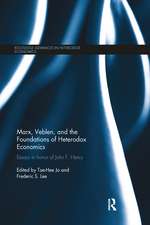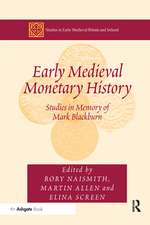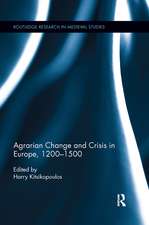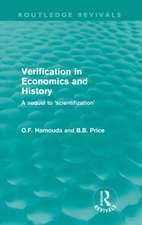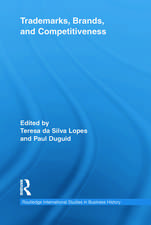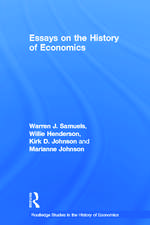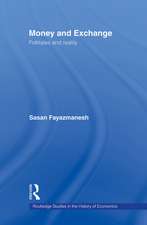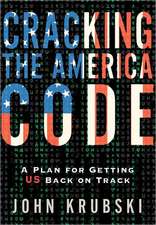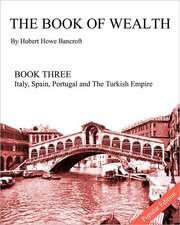The Market and Public Choices: An Ethical Assessment: Routledge Revivals
Autor Alfonso Salinasen Limba Engleză Hardback – 28 noi 2017
| Toate formatele și edițiile | Preț | Express |
|---|---|---|
| Paperback (1) | 56.53 lei 6-8 săpt. | |
| Taylor & Francis – 11 noi 2019 | 56.53 lei 6-8 săpt. | |
| Hardback (1) | 599.31 lei 6-8 săpt. | |
| Taylor & Francis – 28 noi 2017 | 599.31 lei 6-8 săpt. |
Din seria Routledge Revivals
- 9%
 Preț: 903.80 lei
Preț: 903.80 lei -
 Preț: 200.66 lei
Preț: 200.66 lei -
 Preț: 341.55 lei
Preț: 341.55 lei - 9%
 Preț: 767.40 lei
Preț: 767.40 lei -
 Preț: 381.17 lei
Preț: 381.17 lei -
 Preț: 374.02 lei
Preț: 374.02 lei - 9%
 Preț: 934.94 lei
Preț: 934.94 lei - 8%
 Preț: 418.23 lei
Preț: 418.23 lei -
 Preț: 342.36 lei
Preț: 342.36 lei -
 Preț: 200.18 lei
Preț: 200.18 lei -
 Preț: 256.94 lei
Preț: 256.94 lei -
 Preț: 294.53 lei
Preț: 294.53 lei -
 Preț: 258.66 lei
Preț: 258.66 lei -
 Preț: 368.93 lei
Preț: 368.93 lei -
 Preț: 258.66 lei
Preț: 258.66 lei -
 Preț: 286.98 lei
Preț: 286.98 lei -
 Preț: 326.26 lei
Preț: 326.26 lei -
 Preț: 616.29 lei
Preț: 616.29 lei - 9%
 Preț: 764.34 lei
Preț: 764.34 lei -
 Preț: 737.40 lei
Preț: 737.40 lei -
 Preț: 294.91 lei
Preț: 294.91 lei -
 Preț: 294.91 lei
Preț: 294.91 lei -
 Preț: 267.15 lei
Preț: 267.15 lei -
 Preț: 309.99 lei
Preț: 309.99 lei -
 Preț: 295.04 lei
Preț: 295.04 lei -
 Preț: 257.67 lei
Preț: 257.67 lei -
 Preț: 294.72 lei
Preț: 294.72 lei -
 Preț: 245.10 lei
Preț: 245.10 lei -
 Preț: 258.52 lei
Preț: 258.52 lei -
 Preț: 258.66 lei
Preț: 258.66 lei -
 Preț: 246.37 lei
Preț: 246.37 lei -
 Preț: 258.66 lei
Preț: 258.66 lei -
 Preț: 259.47 lei
Preț: 259.47 lei -
 Preț: 230.80 lei
Preț: 230.80 lei - 18%
 Preț: 695.85 lei
Preț: 695.85 lei -
 Preț: 315.88 lei
Preț: 315.88 lei -
 Preț: 153.81 lei
Preț: 153.81 lei - 9%
 Preț: 903.41 lei
Preț: 903.41 lei -
 Preț: 349.80 lei
Preț: 349.80 lei - 9%
 Preț: 1004.17 lei
Preț: 1004.17 lei -
 Preț: 308.78 lei
Preț: 308.78 lei -
 Preț: 230.80 lei
Preț: 230.80 lei -
 Preț: 296.10 lei
Preț: 296.10 lei -
 Preț: 737.40 lei
Preț: 737.40 lei - 9%
 Preț: 729.99 lei
Preț: 729.99 lei - 9%
 Preț: 605.71 lei
Preț: 605.71 lei -
 Preț: 295.62 lei
Preț: 295.62 lei -
 Preț: 382.23 lei
Preț: 382.23 lei -
 Preț: 343.21 lei
Preț: 343.21 lei -
 Preț: 741.10 lei
Preț: 741.10 lei
Preț: 599.31 lei
Preț vechi: 802.56 lei
-25% Nou
Puncte Express: 899
Preț estimativ în valută:
114.75€ • 119.49$ • 95.21£
114.75€ • 119.49$ • 95.21£
Carte tipărită la comandă
Livrare economică 15 februarie-01 martie
Preluare comenzi: 021 569.72.76
Specificații
ISBN-13: 9781138715455
ISBN-10: 113871545X
Pagini: 222
Dimensiuni: 150 x 216 x 18 mm
Greutate: 0.57 kg
Ediția:1
Editura: Taylor & Francis
Colecția Routledge
Seria Routledge Revivals
Locul publicării:Oxford, United Kingdom
ISBN-10: 113871545X
Pagini: 222
Dimensiuni: 150 x 216 x 18 mm
Greutate: 0.57 kg
Ediția:1
Editura: Taylor & Francis
Colecția Routledge
Seria Routledge Revivals
Locul publicării:Oxford, United Kingdom
Cuprins
Contents: Introduction. Moral Knowledge: The necessity and impossibility of a moral criterion; Two types of knowledge; The problem of social choice under a moral relativist framework; Knowledge and its limits; Appendix to chapter 4: Gödel's impossibility theorem; Morality: a history that writes itself; The development of moral knowledge: feelings, reason and free-will; Concluding remarks of part I. Moral Philosophy: Knowledge About Moral Knowledge: Introduction to part II; Ancient philosophy: outlining the groundwork; From the moral implications of 'the Other' to Kantian moral philosophy; Prudence, morality and feelings; Utilitarianism, consequentialism and pragmatism; Concluding remarks of part II. The Market, Moral Knowledge and the Allocation of Resources: Introduction to part III; The market and economic theories: from wealth to ophelimity; Efficiency; The insufficiency of efficiency; Using moral knowledge to assess the market's operation; Externalities; Concluding commentaries; Bibliography; Index of authors.
Notă biografică
Dr Alfonso Salinas is a Lecturer at the Universidad Jesuita Alberto Hurtado in Chile.
Recenzii
'...In this engaging book Alfonso Salinas argues for the primacy of ethics...This book is an excellent read, especially for those who care about social problems and like to be challenged.' Dr Tony Lawson, University of Cambridge, UK '...If you have grown impatient with the amorality of mainstream economic theory and policy, and seek alternatives, this book is a good place to start' Dr Steve Fleetwood, Lancaster University, UK
Descriere
This title was first published in 2003. This book assumes a viewpoint practically absent from contemporary economics by readdressing the original fundamental question of economics: how should we decide how scarce resources should be allocated among competing uses? By focusing on this question the book necessarily reconstitutes the link between ethics and economics. The book deals with a crucial topic: the moral assessment of the market mechanism as a tool for allocating scarce resources.
